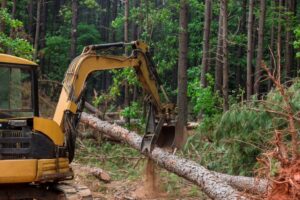You’ve probably seen it before – an excavator seemingly ‘moonwalking’ across the job site, sliding backward as it tries to dig into the ground. This common phenomenon, known as ‘excavator moonwalking,’ is not only an amusing sight but can also be detrimental to your productivity and the safety of your worksite.
In this article, we’ll explore the causes of excavator moonwalking and provide you with practical solutions to help you put an end to this problem once and for all. Proper operator training, regular equipment maintenance, preparing the worksite, and utilizing advanced technologies are all essential components in preventing excavator moonwalking.
By understanding the root causes and implementing the right strategies, you’ll be able to maximize your excavator’s efficiency and safety. So, let’s dive in and learn how to stop your excavator from moonwalking like Michael Jackson and instead have it performing like the powerful digging machine it’s meant to be.
Understanding the Causes of Excavator Moonwalking
To truly tackle the issue of excavator moonwalking, you’ll first need to grasp the underlying causes that contribute to this unusual phenomenon.
Excavator balance and ground stabilization are crucial factors that can lead to moonwalking if not properly addressed. Excavators can experience moonwalking when their balance is off, usually because the weight distribution between the tracks and the counterweight is not optimal. Additionally, ground stabilization plays a significant role, as operating on uneven or unstable terrain can cause the excavator to shift and move unintentionally.
To prevent excavator moonwalking, you must pay close attention to these two factors. Regularly inspect your excavator’s balance by ensuring the counterweight and tracks are in good condition and appropriately distributed. This will help maintain stability during operation. Similarly, always assess the ground conditions before beginning any excavation work. If the terrain is uneven or unstable, take the necessary steps to stabilize it, such as using support mats or adjusting the position of your machine.
By addressing these underlying causes, you’ll be well on your way to stopping excavator moonwalking and ensuring a safer, more efficient worksite.
Proper Operator Training
You’ll see a major difference in your machine’s performance once proper operator training is in place. Operator posture plays a significant role in controlling the excavator efficiently and preventing moonwalking.
With the right training, operators will learn how to maintain a comfortable and balanced posture while working, which can enhance their focus and control over the machine. Additionally, communication improvement between the operator and the ground crew is essential for smooth operations and eliminating any confusion that may lead to the excavator moonwalking.
Training should also include the importance of being aware of the machine’s limits and capabilities and how to properly respond to any unexpected behaviors. This way, operators will be more prepared to react to situations that could cause moonwalking and make appropriate adjustments to prevent it from happening.
Ultimately, investing time and resources in proper operator training will not only minimize the occurrence of excavator moonwalking but also improve overall job site safety and efficiency.
Regular Equipment Maintenance
By keeping up with regular equipment maintenance, you’re ensuring your machine runs smoothly and lessening the chances of any unexpected hiccups that could lead to undesirable movements on the job site.
Preventive measures, such as scheduled inspections, can help you identify and address potential issues before they become significant problems. It’s essential to follow the manufacturer’s recommended maintenance schedule and guidelines to keep your excavator in tip-top shape and prevent any ‘moonwalking.’
In addition to scheduled inspections, make sure you’re checking the machine’s critical components, such as the hydraulic system, tracks, and undercarriage regularly. Keep an eye out for signs of wear and tear, and don’t hesitate to replace parts when needed.
Proper lubrication is also crucial to keep the excavator running smoothly and prevent excessive wear. By staying proactive with equipment maintenance, you’ll reduce the risk of unexpected incidents and keep your excavator firmly grounded on the job site.
Preparing the Worksite
It’s essential to prep your worksite properly, as it not only keeps your machinery grounded but also makes the whole operation run more efficiently.
Site leveling and ground stabilization are two crucial aspects to consider when preparing your worksite to prevent your excavator from ‘moonwalking.’
To achieve this, start by removing any debris, vegetation, or obstacles that may interfere with the excavator’s movement.
Next, level the area using appropriate equipment, such as a bulldozer or a grader, ensuring the ground is even and stable for the excavator to operate on.
In addition to site leveling, ground stabilization is another key factor in preventing excavator moonwalking.
Assess the soil conditions at your worksite to determine if additional support is needed to maintain stability.
If the ground is soft or prone to shifting, consider using ground stabilization techniques such as compaction, adding layers of aggregate, or using geotextiles.
These methods will help to create a solid foundation for your excavator, reducing the risk of slippage and keeping your machinery firmly in place during operation.
Utilizing Advanced Technologies
Imagine the ease and efficiency you’d experience by harnessing advanced technologies to keep your heavy machinery grounded and enhance your worksite’s overall productivity.
Smart sensors and digital monitoring can play a crucial role in preventing the excavator moonwalking phenomenon. These technologies can help you consistently maintain an optimal level of stability and traction, ensuring your excavator remains firmly rooted throughout its operations.
Smart sensors can be installed on your excavator to monitor and adjust the machine’s performance in real-time. These sensors can detect any sudden shifts in weight distribution, ground conditions, or machine movement, and make immediate adjustments to prevent moonwalking.
Digital monitoring systems can also provide you with real-time data on your excavator’s performance, allowing you to make informed decisions about your worksite and equipment management.
By embracing these advanced technologies, you’ll not only put an end to excavator moonwalking but also significantly improve the overall safety, efficiency, and productivity of your worksite.
Conclusion
So, you’ve finally learned how to tackle that pesky excavator moonwalking issue. It’s all about understanding the causes, ensuring proper operator training, performing regular equipment maintenance, preparing the worksite, and utilizing advanced technologies.
Now, go ahead and put these steps into action. You’ll soon see your excavator working smoothly and efficiently, leaving the moonwalking to the dance floor where it belongs



